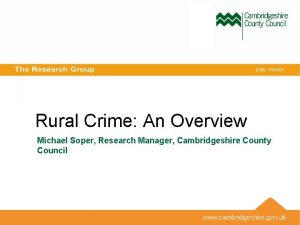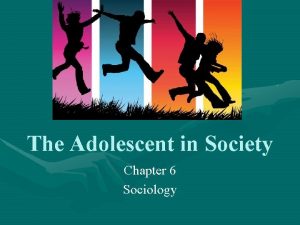RESEARCH KATHERINE SOPER Katherine studied playwriting at Royal





- Slides: 5

RESEARCH

KATHERINE SOPER Katherine studied playwriting at Royal Central School of Speech and Drama. Her first play, Wish List, won the Bruntwood Prize for Playwriting, The Stage Debut Award for Best New Play, and caused Katherine to be nominated as Most Promising Playwright at the Evening Standard Awards. She wrote “The Small Hours” to experiment with "adolescent relationships with time. " Time passes slowly when you're younger and don't have a perception of time passing, and when you're older, time flies by without you noticing. There’s a lot more going on with the characters than what is written in the script, so we read it multiple times to pick up small details. ‘I wanted to write about the differences between adolescence and adulthood and explore whether snapshots of our lives as adolescents can illuminate the people we eventually become, as well as the way time can feel like a wide-open expanse when you’re young. Ultimately I wanted to write a piece that paid tribute to the small yet momentous events and choices of being a teenager, while showing how those fit into the larger shape of a life. ’

TIME Time is defined as the progression of events from the past to the present into the future - Our perception of time is called the "Arrow of Time. ” As soon as we think about the present, it is automatically in the past. The concept of a present is so small that we can never truly capture it in the exact moment it happens. The question of why time is irreversible is one of the biggest unresolved questions in science. Moving back in time could cause a paradox. The "grandfather paradox" is an example. If you travel back in time and kill your own grandfather before your mother or father was born, you could prevent your own birth. And therefore, there wouldn't be a you to kill your grandfather, so he stays alive and it never happens and you're still alive? According to scientists, there is an actual reason why time appears to go by faster when you're older: The amygdala is the region of the brain that makes memories. As more memories form, time seems drawn out, and so, when making memories, it becomes more active. Psychologists believe the brain forms more memories of new experiences than of familiar ones. Since fewer new memories are built later in life, time seems to pass more quickly, as older people already have many similar memories.

DEMENTIA The terms 'Dementia' and 'Alzheimer's' are often used interchangeably, however they are different. Dementia is an umbrella term used to describe several conditions and it includes Alzheimer’s, as well as other conditions with shared symptoms. Dementia affects all people living with their diagnosis differently. This is because the brain is made up of two hemispheres and each has four lobes: frontal, temporal, parietal and occipital. Each lobe has a different function and, depending on which part is damaged by dementia, it can lead to different signs and symptoms. Dementia affects Memory, Cognitive Ability and Communication. The brain is made up of nerve cells (neurones) that communicate with each other by sending messages. Dementia damages the nerve cells in the brain so messages can’t be sent from and to the brain effectively, which prevents the body from functioning normally.

BIBLIOGRAPHY ● ● ● National Theatre (2019) Connections Playwrights 2019: Katherine Soper. Available at: <https: //www. nationaltheatre. org. uk/file/connectionsplays-2019 -small-hours-katherine-soper-0> [Accessed 11 th March 2019] National Theatre (2019) The Small Hours by Katherine Soper. Available at: <https: //www. nationaltheatre. org. uk/content/small-hourskatherine-soper>[Accessed 11 th March 2019] Royal Court Theatre (Unknown) Katherine Soper. Available at: <https: //royalcourttheatre. com/cast/katherine-soper/> [Accessed 11 th March 2019] Anne Marie Helmenstine, Ph. D. (2018) What is time? A Simple Explanation. Available at: <https: //www. thoughtco. com/what-is-time 4156799> [Accessed 11 th March 2019] Exactly What Is Time? (Unknown) Definition of Time. Available at: <http: //www. exactlywhatistime. com/definition-of-time/> [Accessed 11 th March 2019] Alissa Sauer (2018) The 7 Stages of Dementia. Available at: <https: //www. leisurecare. com/resources/7 -stages-dementia/> [Accessed 9 th May 2019] ● ● Dementia UK (Unknown) Symptoms of Dementia. Available at: <https: //www. dementiauk. org/understanding-dementia/symptoms-ofdementia/ > [Accessed 9 th May 2019] Dementia UK (Unknown) What is Dementia? Available at: <https: //www. dementiauk. org/understanding-dementia/advice-andinformation/dementia-first-steps/what-isdementia/? gclid=Cj 0 KCQjwn 8_m. BRCLARIs. AKxi 0 GKN 804 GS_x. Bz. Kg. M 37 l AXT_WHMig 9 UQFu. FTh. V 1 sg 1 Rrkz 2 qz 6 Xwvahka. Ar. JJEALw_wc. B> [Accessed 9 th May 2019]









